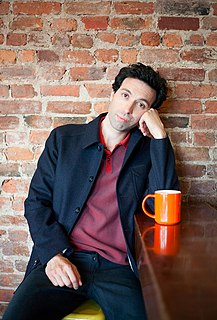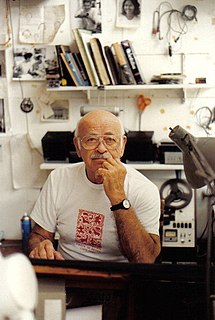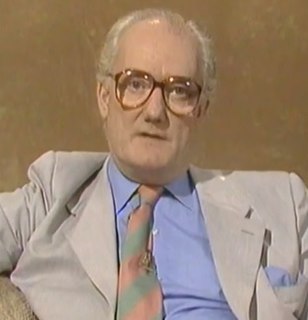A Quote by Barbara Kruger
I think that the exactitude of the photograph has a sort of compelling nature based in its power to duplicate life. But to me the real power of photography is based in death: the fact that somehow it can enliven that which is not there in a kind of stultifying frightened way, because it seems to me that part of one's life is made up of a constant confrontation with one's own death.
Related Quotes
We are left with nothing but death, the irreducible fact of our own mortality. Death after a long illness we can accept with resignation. Even accidental death we can ascribe to fate. But for a man to die of no apparent cause, for a man to die simply because he is a man, brings us so close to the invisible boundary between life and death that we no longer know which side we are on. Life becomes death, and it is as if this death has owned this life all along. Death without warning. Which is to say: life stops. And it can stop at any moment.
Life is a beautiful, magnificent thing, even to a jellyfish... The trouble is you won't fight. You've given in, continually dwelling on sickness and death. But there's something just as inevitable as death, and that's life. Life, life, life. Think of all the power that's in the universe, moving the earth, growing the trees. That's the same power within you if you only have courage and the will to use it.
I do have commitment phobia, which I think is underlied by death anxiety. I feel that if you are in a relationship, there is a real genuine possibility of plateauing, and there is a possibility for a creative, emotional and spiritual death because of it. Only part of me feels this way, but it's enough to create an anxiety which makes me think twice before committing.
The dignity to be sought in death is the appreciation by others of what one has been in life,... that proceeds from a life well lived and from the acceptance of one's own death as a necessary process of nature.... It is also the recognition that the real event taking place at the end of our life is our death, not the attempts to prevent it.
By 'coming to terms with life' I mean: the reality of death has become a definite part of my life; my life has, so to speak, been extended by death, by my looking death in the eye and accepting it, by accepting destruction as part of life and no longer wasting my energies on fear of death or the refusal to acknowledge its inevitability. It sounds paradoxical: by excluding death from our life we cannot live a full life, and by admitting death into our life we enlarge and enrich it.
The Winter Photograph was my Ariadne, not because it would help me discover a secret thing (monster or treasure), but because it would tell me what constituted that thread which drew me toward Photography. I had understood that henceforth I must interrogate the evidence of Photography, not from the viewpoint of pleasure, but in relation to what we romantically call love and death.
It seems to me that one ought to rejoice in the fact of death-- ought to decide, indeed, to earn one's death by confronting with passion the conundrum of life. One is responsible to life: It is the small beacon in that terrifying darkness from which we come and to which we shall return. One must negotiate this passage as nobly as possible, for the sake of those who are coming after us.
I don't know that there were any rules for documentary photography. As a matter of fact, I don't think the term was even very precise. So as far as I'm concerned, the kind of photography I did in the FSA was the kind of photography I still do today, because it is based on passionate concern for the human condition. That is the basis of all the work that I do.
To take, for example, my own death: what I consider most likely to be true is that death will be the complete and utter end of my existence, with no successor existence of any kind that can be related to me as I now am. And if that is not the case, the next most likely scenario, it seems to me, is something along the lines indicated by Schopenhauer. But neither of these is what I most want. What I want to be true is that I have an individual, innermost self, a soul, which is the real me and which survives my death. That too could be true. But alas, I do not believe it.
Photographers usually want to photograph facts and things. But I'm interested in the nature of the thing itself. A photograph of someone sleeping tells me nothing about their dream state; a photograph of a corpse tells me nothing about the nature of death. My work is about my life as an event, and I find myself to be very temporal, transient.
The greatest mystery in life is not life itself, but death. Death is the culmination of life, the ultimate blossoming of life. In death the whole life is summed up, in death you arrive. Life is a pilgrimage towards death. From the very beginning, death is coming. From the moment of birth, death has started coming towards you, you have started moving towards death.
God knows we have our own demons to be cast out, our own uncleanness to be cleansed. Neurotic anxiety happens to be my own particular demon, a floating sense of doom that has ruined many of what could have been, should have been, the happiest days of my life, and more than a few times in my life I have been raised from such ruins, which is another way of saying that more than a few times in my life I have been raised from death - death of the spirit anyway, death of the heart - by the healing power that Jesus calls us both to heal with and to be healed by.
I think Jesus is a fact of history. I think a man named Jesus of Nazareth lived and was crucified. I think his death interpreted his life in a fantastic way, because if you study that life carefully underneath an overlay of theology and mythology, you'll find that the power of that life was that he was constantly giving himself away. He was constantly calling people to be all that they could be.







































